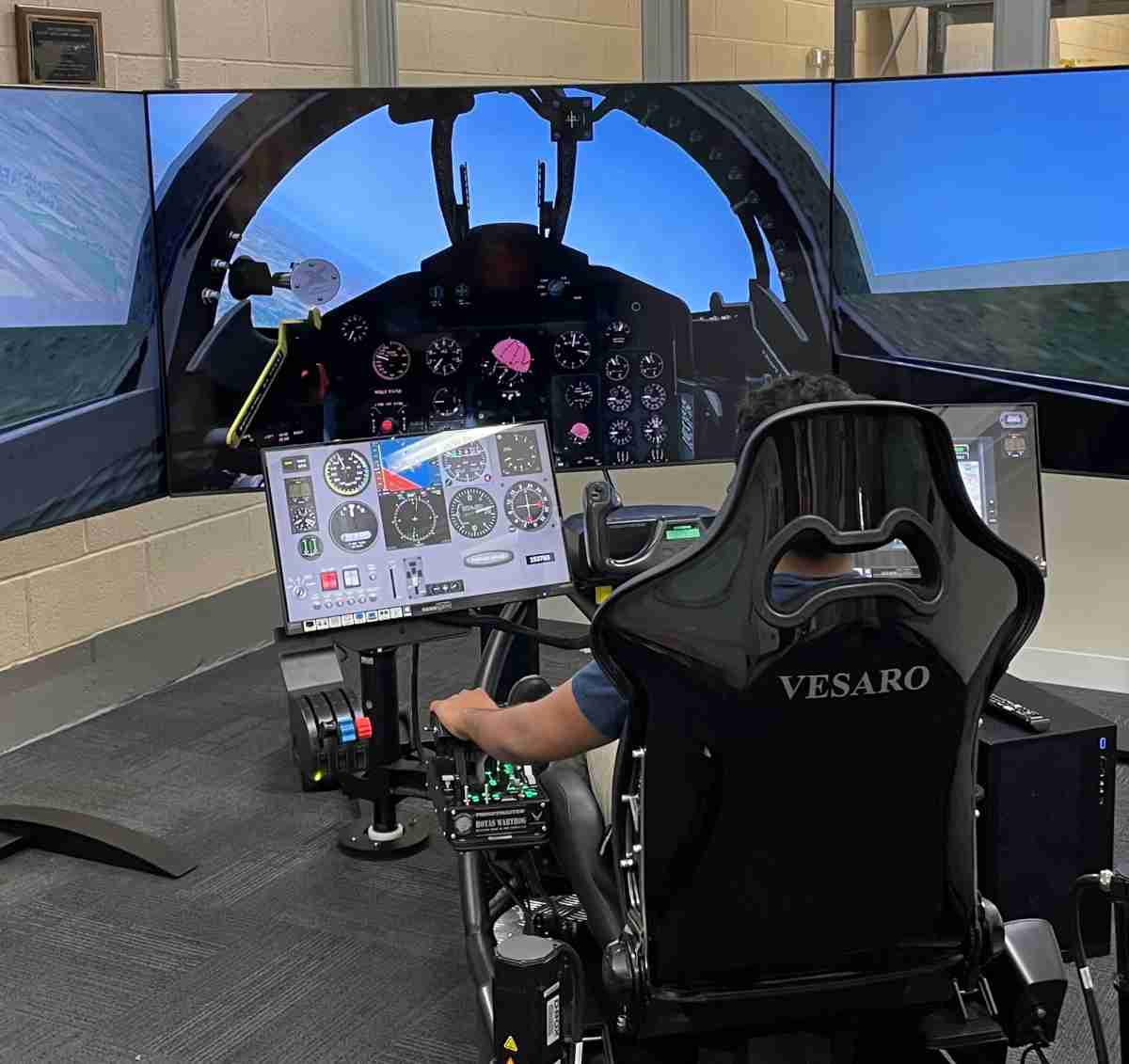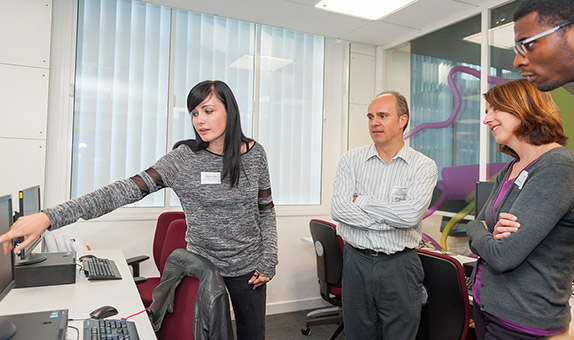Foundation Year in Engineering

Teaching Excellence Framework (TEF) Gold award
Our commitment to high quality teaching has been recognised with a TEF Gold rating. The University has received an overall rating of Gold, as well as securing a Gold award in the framework's two new student experience and student outcomes categories.
Why choose this course?
This course is ideal if you would like to join one of our engineering honours degrees but need a preparatory period of study. It provides an alternative entry route if you do not meet our standard entry requirements but have the ability to succeed at degree-level study.
The foundation year in engineering will develop your practical, technical and communication skills, and you'll apply your knowledge to real-life problems. It's taught at the University and you'll have access to all its facilities.
To apply for the foundation course, please use the application link on the course page of your chosen pathway.
Choose your pathway
- Aerospace Engineering MEng/BEng (Hons)
UCAS code: H408 - Aerospace Engineering (Space Technology) MEng/BEng (Hons)
UCAS code: H405 - Civil Engineering BEng (Hons)
UCAS code: H218 - Mechanical Engineering MEng/BEng (Hons)
UCAS code: H308 - Mechanical Engineering (Automotive Engineering) MEng/BEng (Hons)
UCAS code: H322
| Attendance | UCAS code | Year of entry |
|---|---|---|
| 1 year full time | UCAS codes are included on the relevant webpage for the course you would like to study | 2025 |
| Main Location | Penrhyn Road and Roehampton Vale |
Reasons to choose Kingston University
- The Aerospace Engineering BEng/MEng course received 100% for satisfaction for learning resources (National Student Survey 2018).
- The Civil Engineering BEng degree is accredited by the Joint Board of Moderators (JBM).
- 100% of students from the Mechanical Engineering BEng/MEng course are in highly-skilled employment or further study six months after graduating (DHLE 2016/17).
What you will study
Each module is designed to provide you with the opportunity to develop your knowledge and specific transferable skills appropriate for entry to Year 1 of your chosen engineering degree course.
Please note: for student funding purposes, this is not a separate, stand-alone course, but is designed to form an integral part of a BEng (Hons) or MEng (Hons) degree.
Modules
You will study introductory modules in applied mathematics, engineering mechanics and science required for the later years of your engineering degree. You will begin to learn to conduct and analyse engineering experimental work and to use relevant computing software. You will also be introduced to fundamental communication and study skills.
Core modules
Technology Mathematics
30 credits
This is a core module for the level 3 Engineering Foundation Course. It introduces the student to basic mathematical techniques used in engineering and technology studies. It starts from manipulating numbers (arithmetic) like averages, percentages and fractions then goes onto algebra where solving equation is introduced (linear, quadratic and simultaneous) as well as trigonometry. Then the module explores functions (including exponential, logarithmic and trigonometric) where differentiation and integration are introduced. Initiation to complex numbers and matrices takes place in the second half of the module. The module is primarily delivered through lectures supported by tutorials; additional support material will be made available on ‘Canvas'.
Business, Laboratory and Study Skills
30 credits
This is a core module for the level 3 Engineering Foundation Course. It includes an introduction to business, economic theories, study and communication skills with an emphasis on professional aspects of engineering. It also enables the student to gain confidence in the use of computers and engineering associated programs as well as conduct experimental work further expanding the principles of Statics and Dynamics learned in module EG3010.
The module is delivered through a series of lectures, group exercises, tutorials and laboratory work with additional support material that is available on ‘Canvas'.
Engineering Mechanics
30 credits
This is a core module for the level 3 Engineering Foundation Course. Engineering mechanics is both a foundation and a framework for most branches of engineering; civil, mechanical and astro/aeronautical. This foundation module will consider practical examples from all branches of engineering. The main purpose in studying engineering mechanics is the development of a capacity to predict the effects of force and motion while carrying out engineering design. At the foundation level, students will be encouraged to visualise and sketch physical configurations and to formulate and solve basic mathematical models.
Engineering Science
30 credits
This year zero module provides a firm foundation in the appropriate scientific concepts and laboratory skills that students require to successfully progress in their chosen programmes of study. Students are introduced to the nature of studying in the context of higher education, the need for effective time management and self discipline, planning of work, and the assimilation of facts and concepts within an engineering context. Exposure to a range of scientific areas including electricity, waves and oscillations, heat and thermodynamics, pressure and fluid flow ensures that students studying either mechanical, civil or aerospace engineering benefit from recognizing how scientific concepts find universal application. A significant component of the module consists of the development of practical skills in the laboratory and the analysis of data.
Future Skills
Knowledge to give you the edge
Embedded within every course curriculum and throughout the whole Kingston experience, Future Skills will play a role in shaping you to become a future-proof graduate, providing you with the skills most valued by employers such as problem-solving, digital competency, and adaptability.
As you progress through your degree, you'll learn to navigate, explore and apply these graduate skills, learning to demonstrate and articulate to employers how future skills give you the edge.
At Kingston University, we're not just keeping up with change, we're creating it.

Entry requirements
Teaching and assessment
Teaching includes lectures, seminars, tutorials and practical laboratory sessions. Assessment comprises exams and coursework (e.g. reports, computer and numerical exercises, laboratories and essays).
Who teaches this course?
The course is taught at the Faculty of Science, Engineering and Computing. Faculty staff have a wide range of experience across research and industry and continue to practice and research at the cutting edge of their discipline. This ensures that our courses are current and industry informed ensuring you get the most relevant and up-to-date education possible.
Staff will use their experience and professional networks to hone your skills and shape you into the next generation of science, technology, engineering and mathematics (STEM) graduates.
Postgraduate students may run or assist in lab sessions and may also contribute to the teaching of seminars under the supervision of the module leader.
Course fees and funding
Additional costs
Depending on the programme of study, there may be extra costs that are not covered by tuition fees which students will need to consider when planning their studies. Tuition fees cover the cost of your teaching, assessment and operating University facilities such as the library, access to shared IT equipment and other support services. Accommodation and living costs are not included in our fees.
Where a course has additional expenses, we make every effort to highlight them. These may include optional field trips, materials (e.g. art, design, engineering), security checks such as DBS, uniforms, specialist clothing or professional memberships.
Facilities
There is a wide range of facilities for practical work at our Roehampton Vale campus, where this course is based. You will have access to a modern environment with the latest technology and industry-standard equipment, including:
- 3D design studio and workshop
- mechanical engineering workshop
- rolling roads
- automotive testing facilities
- a Lotus Exige
- cars and motorcycles built by engineering students.
The recently enlarged library at Roehampton Vale provides collections of specialist engineering books and journals.
The £4 million Hawker Wing provides three floors of extra space for students and staff at Roehampton Vale, including improved learning and teaching facilities.
What our students say
After you graduate
Once you have completed this course, you can join a BEng (Hons) or BSc (Hons) engineering degree of your choice at Kingston University in the fields of aerospace engineering, civil engineering, construction management, mechanical engineering, automotive engineering or motorsport engineering, dependent on satisfactory grades.
Course changes and regulations
The information on this page reflects the currently intended course structure and module details. To improve your student experience and the quality of your degree, we may review and change the material information of this course. Course changes explained.
Programme Specifications for the course are published ahead of each academic year.
Regulations governing this course can be found on our website.





